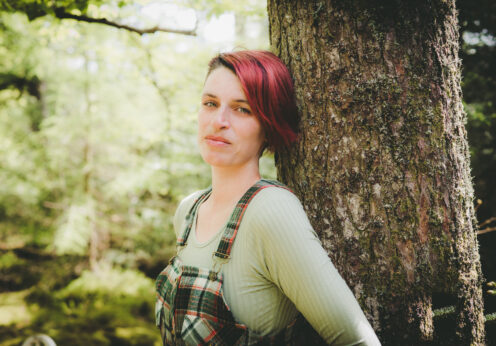By Amy Leeks and Anna Torrance
Featured image: Lorna-Elizabeth
Manchester Metropolitan University’s 16 Days of Activism Against Gender-Based Violence campaign continued with a late-night writing session led by award-winning poet and senior lecturer, Kim Moore.
The session provided a space for participants to harness poetry as a tool for resistance, transformation and healing as Moore introduced a range of poems and illuminated how these poems helped to break silences, raise consciousness and to express anger strategically.
Encouraging her audience to write in a range of styles and structures, Moore showcased how poetry can be a powerful device which can lay a foundation for future change to combat gender-based violence.
Moore began by discussing an array of essays and quotes which inspire change in the face of adversity, including a quote from American writer and professor Audre Lord: “There are so many silences to be broken.” Moore shared how she wanted to help enlighten the ways poetry helps to break the stigma of violence and dehumanising attitudes against women and girls.
Moore continued with an in-depth analyse of how poetry directly challenges gender-based violence though different strategies. She shared how anger can be expressed through poetry, which allows us to work through our anger rather than drown within it. This anger evokes need for change and highlights how poetry is action and not just dream and vision, she explained.
Moore introduced the poem ‘Scene 1’ by Joelle Taylor. A moving piece extracted from Taylor’s book, C+nto & Othered Poems, Moore illustrated how this extract uses imagery and theatrical themes in order to break down the conventions of what a traditional poem consists of. A striking line from the poem describes how a woman walks into a bar: ‘She notices she is sitting at every table.’
Moore then encouraged her audience to write their own poems inspired by Taylor’s work, allowing themselves to write new types of poems with their own imagery, emotion and perspective. Reiterating the ideas that poems can strategically portray anger, raise consciousness and break silences, Moore also encouraged the point of how resistance is ‘multifaceted’ and that there are many individual ways to resist gender-based violence within poetry.
Continuing to tackle her colleagues’ poetry in the workshop, Moore shared Helen Mort’s poem ‘On Performance’. The work deals with ‘the beauty of the naked form’ and a resistance against hurtful comments surrounding a dislike of tattoos. Moore explained how this piece refuses to succumb to these comments, and instead embraces all the things she loves about her tattoos; likening them to flowers, and art to be coloured in.
Moore encouraged the audience, once again, to go away and write in this style. She invited them to consider ‘backhanded insults’ they’ve encountered, and write a piece in which they refuse to let these statements have agency or influence – just as Mort has done. The aim was seemingly to take power away from those with mal-intentions and a wish to cause harm, and instead rising up against this through art and writing.
Both the poem and exercise were a perfect example of what the festival is trying to achieve, by overcoming prejudice and hate through something as transformative and healing as poetry. “I absolutely see poetry as transformative, it transforms me all the time! It helps me to see the world and society in a new way and it helps me to discover or make my way back to myself if I am lost,” said Moore.
Closing the workshop, Moore shared ‘Granny’s Love Poems’ by Malika Booker. The poem reimagines stereotypes surrounding grandmotherly figures, challenging conventional narratives about women and their roles. Moore said: “Poetry can allow us to imagine different realities and new possibilities to change the kind of pain that we’ve that we’ve gone through.”
Moore described how the poem imagines a reality different to the one that we are all so familiar with, concerning the stereotypical ‘granny’ and female figure. Instead, the audience were made aware of how Booker is “imagining the different”, which calls the opposite into being.
Each of the works tackled by Moore in the workshop confronted predisposed stereotypes about women from all different backgrounds and communities. During the event, Moore shone a light on a multitude of experiences from female writers illustrating the battle against even the subtlest of gender based violence.
Held late in the evening to accommodate parents and those with demanding weekday schedules, the workshop aimed to create an accessible space for reflection and creativity: “No event is ever fully accessible to everyone, but I hope this means parents can come and write and have an hour to themselves.”
For those who missed the session, Moore hosts similar workshops in January, offering ongoing opportunities to engage with poetry as a tool for activism.
The 16 Days of Activism Against Gender-Based Violence Festival runs from 25th November to 10th December, 2024. For more information and tickets, visit mmu.ac.uk/news-and-events.






Leave a reply